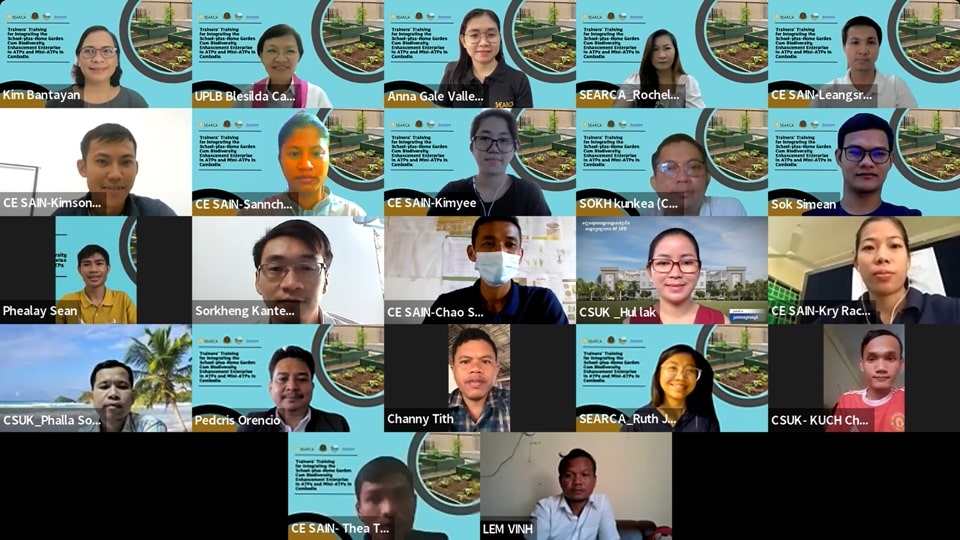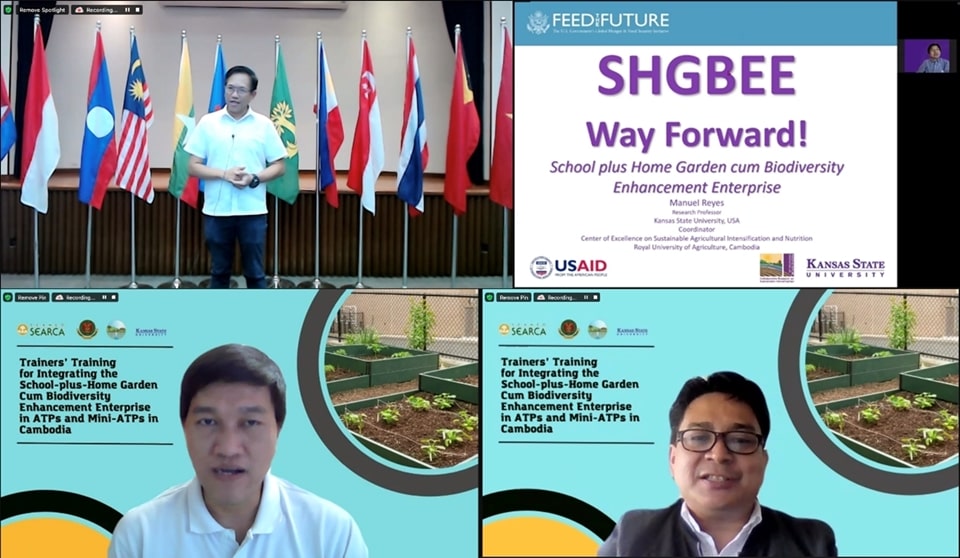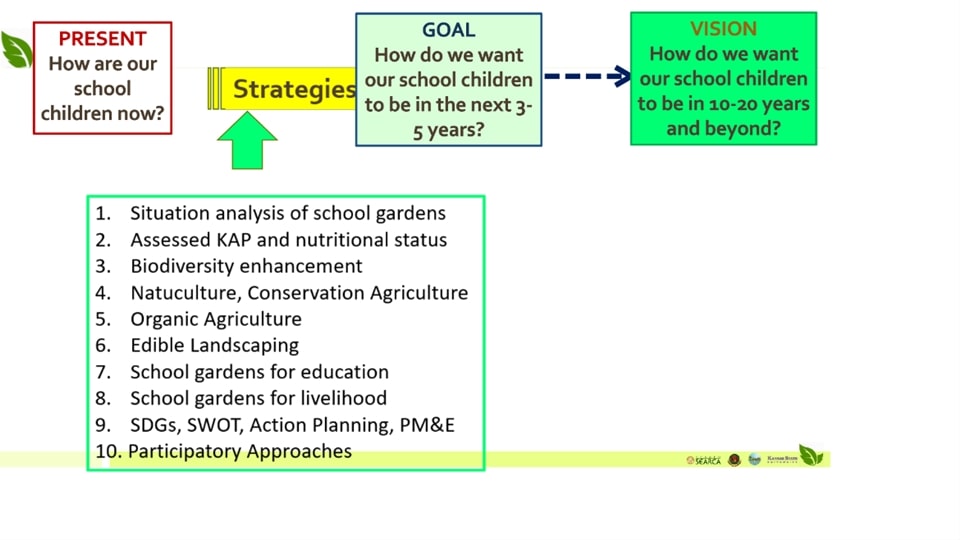The final session of the e-training titled, Trainers’ Training for Integrating the School-plus-Home Gardens cum Biodiversity Enhancement Enterprise (SHGBEE) in the Establishment of Agricultural Technology Parks (ATPs) and Mini-ATPs in Cambodia, concluded on 2 March 2022, via Zoom platform. This has been the online learning event organized and implemented by the Southeast Asian Regional Center for Graduate Study and Research in Agriculture (SEARCA) and the Center of Excellence on Sustainable Agricultural Intensification and Nutrition (CE SAIN), in partnership with the Kansas State University (KSU) and the University of the Philippines Los Banos (UPLB).
 Participants and organizers of SHGBEE Cambodia.
Participants and organizers of SHGBEE Cambodia.
The training program is designed under the efforts of boosting the capacity of teachers and local government offices of the target schools for the ATPs and mini-ATPs in Cambodia. This is also a part of the ongoing scaling-up strategies to sustain and expand on the lessons learned and best practices of the project titled, "Participatory Action Research on School and Community-Based Food and Nutrition Program for Literacy, Poverty Reduction and Sustainable Development," or School-plus-Home Gardens Project (S+HGP) piloted in the Philippines. From 2016 to 2017, SEARCA boarded on this collaborative action research project using the school gardens as an approach to improve the nutrition, education, and economic well-being of school children in the country. It was successfully implemented in six pilot schools in Laguna, Philippines through a partnership among SEARCA, UPLB and the Department of Education (DepEd) School Division Office (SDO) of Laguna.
The last session featured relevant and timely topics such as action planning for a better normal (post covid 19 pandemic), participatory monitoring and evaluation (PM&E), and M&E system for school gardens and the school-based feeding program (SBFP). The first two topics were discussed by Dr. Blesilda M. Calub, a University Researcher from the Agricultural Systems Institute of UPLB. In her lecture, Dr. Calub explained PM&E as a process that involves multiple stakeholders in designing the M&E system, and in collecting, analyzing, and sharing the information. She articulated that PM&E is important because it builds capacities and negotiation skills by jointly analyzing, reflecting, and assessing progress and obstacles of the project. This is essential in the context of school gardens because the participants could collectively track the establishment and implementation of gardens in their respective schools, thus, may result in a more organized operation. Complementing the PM&E with action planning, Dr. Calub then tackled that strategic planning of assessing the current situation of schools and applying what the participants learn from the ten sessions could be translated into goals and vision. She emphasized that good action plans are SMAART: Simple, Measurable, Achievable, Agreed upon, Relevant, and Time-bound.
 Dr. Calub and Mr. Perolina presenting the topics for Session 10.
Dr. Calub and Mr. Perolina presenting the topics for Session 10.
On the other hand, the third topic of the session which is the M&E system for school gardens and the school-based feeding program was presented by Mr. Lamberto C. Perolina, Education Program Supervisor (EPS) in the Schools Division of Laguna, Department of Education (DepEd). Mr. Perolina explained the different methods in conducting M&E which are formal survey, performance indicator approach, participatory method, and cost-benefit and cost-effectiveness analysis. He also showed the M&E sample template of the Gulayan sa Paaralan Program (GPP) which consists of the school profile and monitoring tool of the SDO, criteria for evaluation of best school implementer of GPP, and the SBFP terminal report. This could equip the participants on how they would want to develop their M&E system for reporting progress. After the lecture, the attendees join the breakout session to do the workshop. They were tasked to formulate a vision, goal statements, and action plan for the implementation of the SHGBEE Project in the pilot schools in Cambodia.
As a culmination of the whole e-training series, a closing program was held. Professor Joselito G. Florendo, SEARCA Deputy Director for Administration; Dr. Lyda Hok, CE SAIN Director; Dr. Manuel R. Reyes, Research Professor and Agroecological Engineer, KSU; and Dr. Pedcris M. Orencio, Program Head, SEARCA RTLD Program Head, gave their congratulatory and way forward messages to the participants.
 Speakers during the closing program.
Speakers during the closing program.
Recapitulating the whole training program, the participants were able to learn ten topics under six modules namely: Module 1. Sharing Initiatives on School Gardens; Module 2. School and Home Gardens for Food And Nutrition; Module 3. Guiding Concepts of S+HGP; Module 4. School and Home Gardens for Livelihood; Module 5. Participatory Visioning and Goal Setting; and Module 6. Action Planning Participatory Monitoring and Evaluation. These modules featured topics on situation analysis of school gardens; assessment of KAP and nutritional status; biodiversity enhancement; natuculture and conservation agriculture; organic agriculture; edible landscaping; school gardens for education; school gardens for livelihood; SDGs, SWOT, action planning, PM&E; and participatory approaches. The 10-week topics shall answer the question on how to start a school and home gardens. At the outset, the apparent condition of the children in school should be taken into consideration. Thereafter, the strategies which are the topics discussed will come in. This will all lead to meeting the goal of how they would want their school children to be in the next 3-5 years and the vision of how they would want their school children to be in 10-20 years and beyond.
 Conceptual map of the SHGBEE e-training in Cambodia.
Conceptual map of the SHGBEE e-training in Cambodia.
The e-training series was successfully spearheaded by SEARCA’s Research and Thought Leadership Department (RTLD) Education and Collective Learning Department-Training for Development Unit (T4DU).